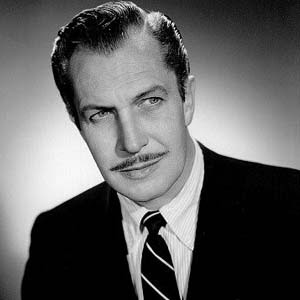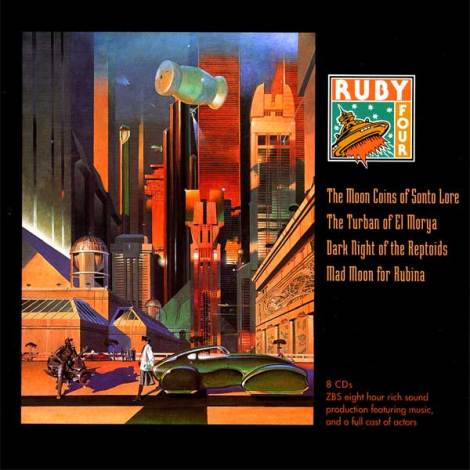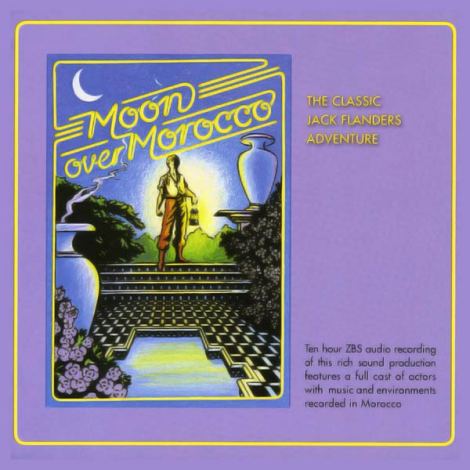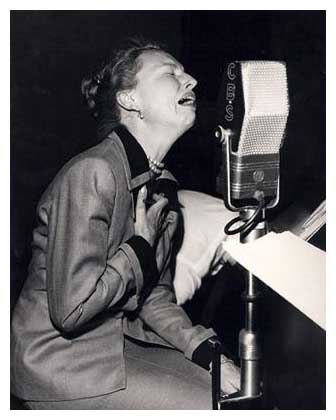The Top 10 Greatest Radio Dramas
I am about to discuss something that is too nerdy even for most dyed-in-the-wool geeks. Like college a cappella, the fineries of obscure chess variants, grand opera, Furry artwork, or filking, this is well past the forests of mere popular culture, and deep, deep into the mires of geek territory. I am going to write an article on radio drama.
It somewhat baffles me as to why the art of radio drama is not more popular than it is. These days, the art is mostly seen as either dated, being regulated to late-night reruns of old-timey, public domain shows from the 1940s broadcast on AM radio, or to live performances by modern-day comedians and hipster hobbyists, who are still stuck on the old-timey format. In this age of science-fiction ubiquity, and fantasy entertainment reigning supreme across most every facet of popular culture, it’s a wonder that more amateurs aren’t composing hugely ambitious sci-fi mythologies for the audio-only form.
I love radio drama. Radio is a medium that requires more imagination than television; it requires more mental input from the audience, and is thusly more stimulating to the listener. It is hugely versatile, and, with modern digital recording equipment being as available to the public the way it is, much easier to produce than video. We have hundred of ambitious commentators posting podcasts on iTunes every day. Are there any people interested in audio plays anymore?
As it turns out, there are. There are a few hard-working radio drama pioneers still entrenched out there, though, and it is they who are keeping the form alive. There are also still many classics from decades past lurking out there in the ether, which are, thanks to the mad cataloging that supports the internet, largely available for immediate listening. In the spirit of supporting an oft-ignored storytelling mode, I have compiled a list of the ten greatest radio dramas ever produced. For most of you, I understand this list will serve as an introduction. By all means, I implore you to explore this underrated and underutilized medium.
10) Brave New World (1956)

In 1956, Aldous Huxley adapted his famous 1932 novel for radio. It aired on CBS Radio on January 27th, and February 3rd. By 1956, the warning of the novel had already started to prove themselves true, and Huxley was understandably bitter that few people had bothered to heed him. In an introduction, he posits that the lessons are just as relevant today as they were 25 years previous, and you can hear the bitterness in his voice.
The actors in the show are all CBS regulars, and many lack the sardonic oomph of Huxley dystopia fantasies, but the words speak for themselves in this case. In 1956, a lot of the sex talk had to be dampened as well, but, as with most thing audio, all we need is a small hint at what’s going on, and we can picture it all too vividly in our heads. By the end of the show, we finally get the tragedy thrust in our ears, and the false, melodramatic sadness of the actors gives way to gut-wrenching dread.
All fans of sci-fi should read Brave New World. All fans of Brave New World should track down this radio adaptation.
Listen to part one here: http://recordbrother.typepad.com/imagesilike/files/brave_new_world_side_1.mp3
Listen to part two here: http://recordbrother.typepad.com/imagesilike/files/brave_new_world_side_2.mp3
9) The Origin of Superman, Retold (1945)

By 1940, the famed 1938 comic book character had already taken the world by storm. Superman became a household name, and the idea of a new type of alien sci-fi pop hero was introduced to the masses. The comic was for the kids, as was the Fleischer cartoon that was to be produced in the ensuing years. The first real actorly dramatization of The Man of Steel was the radio serial. The show was a huge hit, and ran for 11 years, starting on WOR in New York, and landing on ABC by its end.
The best episode of the show was easily the 1945 episode “Superman Comes to Earth” which was a re-telling of his origin story, greatly expanded from the first episode two years before. In its own way, hearing Jor-El cooing to his baby, as he puts it in the pod moments before Krypton blows up is far more heartbreaking than any other version. The two-part form also allowed for much more of the story to be told, and allowed the narrator, Jackson Beck to fill us in.
It was first here that audiences heard the phrases “Faster than a speeding bullet!” and “Able to leap tall buildings in a single bound!”
The voice of Superman was played by Bud Collyer, who may be the man responsible for inventing Kryptonite. Most radio serials didn’t operate on a seasonal/rerun form, and when an actor needed a break, they merely weren’t in that week’s episode. When Superman himself was to absent, he was laid up in bed after a bad case of kryptonite poisoning. Clever. And now iconic.
8) Yours Truly, Johnny Dollar: The Todd Matter (1956)

Most heroes of the past were kind of square, milquetoast types. Heck, even Superman was irrepressibly moral and obnoxiously virtuous. Occasionally, you’d have a Harry Lime, or wicked, nourish antihero, but the bulk of them were squares that most modern geek darkness-junkies can’t really get behind. What “Yours Truly, Johnny Dollar” (1949-1962) did was make a virtuous character seem interesting. He was more that a broad type. He was a well rounded person.
The show followed the strange adventures of the titular insurance investigator, who would investigate unusual claims. Inevitably, the claim would reveal some criminal conspiracy, and Johnny (Charles Russell) would have to use his smarts to come out on top.
The best episode was probably the most notorious, as it was one of the first shows to feature a special guest star, in this case, Bob Bailey. I don’t want to give away any of the story, but do implore you to track down any episode of this show. It’s like a cross between Perry Mason and Dr. Who. Just without the sci-fi stuff.
“Yours Truly, Johnny Dollar” was one of the last shows to leave the airwaves, lasting all the way until 1962. Its final episode was followed by the final episode of the long-running “Suspense!” Many cite that fateful evening in 1962 as the end of the Golden Age of Radio
Listen to “The Todd Matter” here:
7) Escape: “Three Skeleton Key” (1950)

A 30-minute program that ran from 1947 until 1954, “Escape” was a show that was trim on its premise. Every episode featured a person in peril, usually at the hands of some natural disaster or animal attack, and would trace their adventure as they either were devoured or had escaped. It was kind of predictable, and some of the setups were a little weird; in one episode a group of jungle dwelling imperialists had to escape from billions of ants. It was only when classic adaptations entered (“The Fall of the House of Usher,” “The Most Dangerous Game”) that the show shined.
But one episode is the clear champion of the series: “Three Skeleton Key,” featuring Vincent Price. A team of lighthouse workers are beset by a ghost ship that crashes on the rock below. Pouring from the ship was millions upon millions of rats that immediately coated the lighthouse. The show is then a slow burn on the part of the actors, as they are driven mad by their inability to escape the terrifying noises of the rats gnawing on the walls.
There is something gut-wrenching about radio horror that is lost in the visceral gore of film. Perhaps it’s our imaginations filling in the gaps. Perhaps it’s just my own sensitivity to those growling rats. Either way, “Three Skeleton Key” is a horror waiting to be rediscovered.
Listen to it here: http://www.escape-suspense.com/files/three_skeleton_key.mp3
6) The Knox Riots (1926)

Sadly, this show has been lost to time, as early radio broadcasts were not kept in an archive, but the story of Fr. Ronald Knox and his infamous radio hoax should be briefly discussed in any rundown of radio history.
In 1926, most home radios were listened to on headphones, making for an intimate experience. For the first time, people could stay abreast of breaking news, and experience professional music on a daily basis right in their homes. It was this early framework that allowed the playful priest Ronald Knox to perpetrate what is considered one of the greatest hoaxes of all time. He wrote and performed a fake news story (which he believed was a wry satire, all in good taste) that claimed that a class uprising had begun, and people took to the streets in protest. There was a public lynching, and Big Ben was destroyed.
The report was not taken with lightness by the public, and the story of the fake riot nearly caused a real one. 1926 was a touchy time in terms of class relations, so most people weren’t in the mood to joke. Knox appeared on the radio the next day to explain that what he had performed was an art piece, and he apologized. Radio historians feel that he was only half sincere, and was proud of the panic he caused.
The American press has a field day with the hoax. This was, mind you a decade before “War of the Worlds.”
In 2005, the BBC did discover some of the original transcriptions of the broadcast, and recreated it for modern listeners. You can download the recreation from the BBC website. It’s rather funny.
Read my further report here: http://90ways.com/critarchive/crit103.php
5) Ruby 4 (1994)

The ZBS Foundation was formed in the early 1970s by a small group of ambitious hippies hoping to make radio drama, hard-hitting interviews, all while living on an ambitious commune. The commune only lasted a few years, but the radio foundation has remained in operation to this very day, regularly producing a particular brand of spiritually bent, intellectually stimulating, and utterly whimsical fantasy stories that everyone would do well to listen to.
Like any long-working writer, the foundation’s one author, Meatball Fulton, had a series of stock characters he would often return to. The most popular of which was the Galactic Gumshoe, Ruby. Ruby (Laura Esterman, a.k.a. Blanche Blackwell) was a sassy P.I. living on the planet of Summa Nulla in the distant future. She had the ability to slow time. Together with her band of misfits – including an ambitious techie, a lecherous archeologist, and a sniveling rat monster – she would uncover all manner of multidimensional conspiracies and disgusting supervillains, the mob, and sometimes even gods.
The fourth in the Ruby series was the longest and the most epic adventure of the lot, which had Ruby traveling to the seventh dimension to halt the energy leeching perpetrated by an evil race of intelligent reptiles. The music (by Tim Clark) and the characters are all indelible, and fit no known mould. The story can dip into the ridiculous, but when the ghost of Nikola Tesla shows up on the planet Venus, all will be forgiven.
For anyone with an extra $50 burning a hole in their pocket, I cannot recommend highly enough that you go to http://www.zbs.org/ and plunk it down on a copy of “Ruby 4.” You won’t regret it.
You can listen to a few samples here,
One: https://www.zbs.org/catalog/audioSamples/R4_Part_One.mp3
A second: https://www.zbs.org/catalog/audioSamples/R4_Part_Three.mp3
A third: https://www.zbs.org/catalog/audioSamples/R4_Part_Four.mp3
4) War of the Worlds (1938)

Yes, the Orson Welles version. The story is pretty familiar to everyone. On Halloween night in 1938, Orson Welles and his nascent Mercury Theater On the Air created a radio drama – based on the famous novel by H.G. Wells – in the form of a news broadcast, informing the citizens of the world that aliens being had landed in the U.S., and were vaporizing people by the score. Since the Mercury Theater ran opposite the Edger Bergen and Charlie McCarthy show, most of the listening audience was listening to the comedy on the more popular program, hence missing Welles’ introduction stating that it was all a drama. Buy the time the musical portion of McCarthy had ended, people switched stations, and freaked out.
Just like the Knox Riots before it (and the Brits had just as enjoyable a field day with this as the Americans did with the Knox Riots), “War of the Worlds” caused a minor panic, causing some distressed listeners to briefly horde guns, and hide out in their basements from the alien menace. Welles was forced to give an apology, but, in that inimitable way of his, gave it kind of backhandedly.
Listening to the show again, you’ll find that it’s still a powerful drama, and a clever way to present a story to an audience; it finally takes advantage of the media in a way that is hardly explored any longer. Welles, while an arrogant prick, was also a brilliant young artist who could break boundaries with a smirk and a wink. Only a few years later, he would unleash “Citizen Kane” on the world.
Here it is, if you haven’t heard it: http://ia341316.us.archive.org/3/items/OrsonWellesMrBruns/381030.mp3
3) Johnny Got His Gun (1940)

A word you hear a lot these days is “unfilmable.” Occasionally a filmmaker will come through with a film of something that was previously thought to be too abstract to put on the screen. “The Diving Bell and the Butterfly” is a good example. This year’s “127 Hours” is another. But back in the day, it was questioned if Dalton Trumbo’s 1938 book “Johnny Got his Gun” could be adapted to radio. It was an internal monologue spoken by a young man who had lost his limbs, face, sight and hearing in a WWI bomb blast. It was stridently anti-war, and presented some very real damages that wars do to soldiers.
In 1940, Arch Oboler adapted the story to radio, for his short-lived show “Arch Oboler’s Plays.” It was one of the finest shows ever produced. The monologue was spoken by James Cagney, and it was told in flashback, and from the perspective of the injured soldier’s doctors. The radio show ends on a much more positive note than the book (which had the soldier banging his head in Morse code, begging for euthanasia), having him finally learn to communicate with the outside world.
While Trumbo himself directed a fine film version of “Johnny Got His Gun,” this 1940 radio edition reaches a deeper emotional level. It’s political without losing its touching emotions. It’s harrowing without being horrific. It’s a virtuoso piece of voice acting from a character who is, essentially, just a voice in his head. Listening to this story on radio makes you feel like you are that solider. This is not something film can accomplish.
2) Moon Over Morocco (1972)

A ten-hour epic, “Moon Over Morocco” is a gorgeous spiritual journey out of the ZBS stable, and its best. Another of the studio’s stock character, traveler Jack Flanders (Robert Lorick) travels the world looking for the secrets to spiritual magic which, he finds, still exists in faraway esoteric places. “Moon Over Morocco” is possessed of the trademark ZBS sense of humor, but feels far more natural than most. The sounds were all recorded in Tangier, and the story is based on real Berber mythologies from deep within the ancient desert. You can practically smell the dried, scented winds of Morocco.
The story had Jack traveling deep into the desert with two companions in tow. He accidentally finds a mystical storyteller who somehow spirits him off to another dimension where he finds himself split into two halves, leading two armies in a magical battle. There is clearly more to it than this (as it is, after all, ten hours long), but that will do for now. Also on the ZBS website is a collection of samples.
Jack Flanders is a great character. He is socially naïve, but spiritually aloof, as he stumbles through most of his multidimensional trappings with utter confusion, but still seems wiser than most of the character around him. Jack would go on to star in dozens more shows, and is still in shows being made today. This is a backwater of fantasy epics that is too rarely explored.
A sample: https://www.zbs.org/catalog/audioSamples/MOM_Episode_1.mp3
1) Sorry, Wrong Number (1948)

And the top of the heap is actually a rather obscure one. In 1948, Agnes Moorehead gave one of the great hysterical performances in this cheap little throw-off thriller that appeared on the “Suspense” program. What was intended to be just another episode has, in retrospect, become one of the most ingenious uses of radio that the medium has to offer.
Moorehead plays an unassuming woman on the telephone who overhears an accidentally crossed wire of two gangster types who are planning to kill someone in less than 30 minutes time. The rest of the show is Moorehead’s increasingly desperate real-time struggle to find someone on the phone who will help her. Eventually, there is a twist, which I would dare not spoil, only to say that it’s a brilliant piece of writing.
There were eight versions of “Sorry, Wrong Number” recorded over the years, including a feature film. I haven’t heard them all, but the original is the best I’ve heard.
Not only is this a wonderful piece of over-the-top acting on Moorehead’s part, as well and a brilliantly written real-time thriller, but, like “Johnny Got his Gun,” is a story that is ideally suited for radio, and exploits the medium to the fullest of its potential. All we hear are voices, as if we are a helpless telephone operator, unable to help this poor hysterical woman. It turns the microphone on us, and makes the listener into the voyeur that they so clearly are. It takes little to be self-referential, but if you can do it while not making it look like you are, then you’ve achieved a level of genius.
Download it from this website: http://www.escape-suspense.com/2008/11/suspense—sorry-wrong-number.html
Witney Seibold is a hard-working and nerdy, nerdy man living in Los Angeles, where he listens to old radio, reads old books, and is mocked by his peers for not being more up-to-date. He has written two award winning radio scripts with the National Audio Theater Festival. He writes an awful lot, not only for Geekscape, but for his own ‘blog, Three Cheers for Darkened Years! Which includes over 700 articles to date. You can access his site here:http://witneyman.wordpress.com/
Podcast: Play in new window | Download ()
